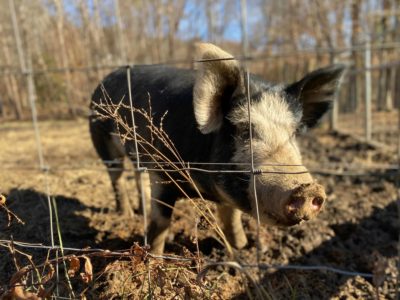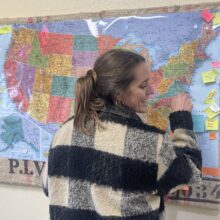Hayesville, North Carolina sits along the Hiwassee River in Clay County and is home to part of the Chatuge Lake. Drive a little in the wrong direction, and you’ll end up in Georgia. It’s common to hear locals say, “We are two hours from everywhere.” Two hours west of Asheville, two hours north of Atlanta, and two hours east of Chattanooga — you can look at the town’s location as an advantage or a challenge.
Fly fishing fans flock to Fires Creek for exceptional fishing, hikers can access parts of the Appalachian Trail close by, and families can escape those aforementioned cities for a vacation in the Blue Ridge mountains. The rural and remote landscape provides beauty, but can also present challenges for locals.

Quality of life in Clay County
The Hinton Rural Life Center, located in Hayesville, discovered that one of those major challenges was housing. In 2016, the center partnered with the University of North Carolina at Greensboro (UNCG) and released a quality of life study for Clay County, Cherokee County, and Towns County (in Georgia). The Hinton Rural Life Center has worked in Clay County for more than 50 years with a focus on making homes warmer, drier, and safer, and with this study, they had data to back up their initiatives.
Dr. Stephen J. Sills, associate professor and director at UNCG’s Center for Housing and Community Studies, led the quality of the life study. Sills says, “housing is related to the health of the community. We find that substandard housing is correlated with several health problems and mental health issues.” Stephanie Johnson, director of the Clay County health department, said in 2016 that chronic lower respiratory disease was the third leading cause of death in the county.
The quality of life report found that in Clay County, 24.9% of homeowners were cost burdened and 12.04% were extremely cost burdened. For renters, the statistic is higher, with 44.02% of renters being cost burdened, and 34.39% being extremely cost burdened.
When people are cost burdened, they can’t think about anything else other than keeping the lights on and feeding their families. With these factors present, what could be done to improve the lives of Clay County residents?
Small things making large impacts
The Hinton Rural Life Center used this data as a catalyst to create The Council for Collaborative Impact (CCI), a group formed to focus on seven areas that, if improved, could change the lives of county residents. Concentrated on children’s issues, economic development, education, housing, substance abuse, technology, and transportation, the council produces initiatives surrounding those focus areas and uses community assets to their advantage.
One of those community assets is the retired population. People move to Hayesville and the surrounding area after retirement and want to be involved. In their housing initiative, the Hinton Rural Life Center focuses on the non-medical drivers that impact health with their home repair ministry and educational programming. They also saw an opportunity to help lessen the burden of electric bills by providing firewood for locals to heat their homes.
Enter the Woodchuckers — a group of volunteers who meet every Wednesday morning and chop wood for county residents in need of warmth.
This firewood ministry solves multiple problems at once. The program is helping curb electricity bills by helping heat houses, and with lower bills, those considered cost burdened won’t fall behind on other payments. Through research in the area, they found one of the main factors for bad credit scores is failing to pay on time. Combine the community assets of people with the ability and time to help, along with a resource Clay County naturally provides — wood — and you have a small win.
The program gets the community involved, and those who receive wood sometimes also come and volunteer. There is fellowship and common ground shared when loading up timber.
“Since the quality of life study, we have a better understanding of our community. We also understand the social determinants of health and how they impact our services,” says Jaqueline Gottlieb, president and CEO of the Hinton Rural Life Center.
The firewood ministry is just one way the Hinton Rural Life Center looks to “walk alongside the neighbors” of Clay County, and improve their quality of life.

Woodchuckers in Hayesville. Caroline Parker/EducationNC 
Firewood ministry in Hayesville, NC. Caroline Parker/EducationNC
Recommended reading







